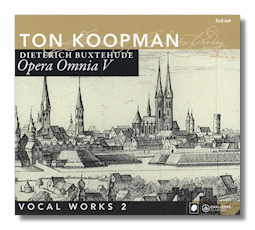
The Internet's Premier Classical Music Source
Related Links
- Buxtehude Reviews
- Latest Reviews
- More Reviews
-
By Composer
-
Collections
DVD & Blu-ray
Books
Concert Reviews
Articles/Interviews
Software
Audio
Search Amazon
Recommended Links
Site News
 CD Review
CD Review
Dietrich Buxtehude

Opera Omnia V – Vocal Works 2
- Benedicam Dominum, BuxWV 113
- Befiehl dem Engel, daß er komm, BuxWV, 10
- In dulci jubiol, BuxWV 52
- Jubilate Domino omnis terra, BuxWV 64
- Ich suchte des Nachts in meinem Bette, BuxWV 50
- Du Frieden-Fürst, Herr Jesu Christ, BuxWV 20
- Divertissons nous aujourd'hui, BuxWV 124
- Magnificat anima mea, Domine BuxWV, Anh. 1
- Wie wird erneuet, wie wird erfreuet, BuxWV 110
- Ihr lieben Christen, freut euch nun, BuxWV 51
- Afferte Domino gloriam honorem, BuxWV 2
- O fröhliche Stunden, o herrlicher Tag, BuxWV 120
- Drei schöne Dinge sind, BuxWV 19
- Missa brevis, BuxWV 114
- Liebster, meine Seele saget, BuxWV 70
- Canon duplex per augmentationem, BuxWV 123
- Cantate Domino canticum novum, BuxWV 12
- Nu låt oss Gud, vår Herre, BuxWV 81
- Herren var Bud, BuxWV 40
- Heut triumphieret Gottes Sohn, BuxWV 43
Bettina Pahn, soprano
Johannette Zomer, soprano
Bogna Bartosz, contralto
Patrick van Goethem, alto
Daniel Taylor, alto
Jörg Dürmüller, tenor
Andreas Karasiak, tenor
Donald Bentvelsen, bass
Klaus Mertens, bass
The Amsterdam Baroque Orchestra & Choir/Ton Koopman
Challenge Classics CC72244
Ton Koopman and such projects as this – to record all Buxtehude's works – continue to garner honors: his CDs number 22 in the Bach complete cantatas, for example, have just won a BBC Music Magazine award (2008) for best choral release. No wonder. Basically the same forces, The Amsterdam Baroque Orchestra and Choir with soloists, have such a perfect blend of passion and exactness in the way they approach the 20 works by Buxtehude on the current two-CD set also from Challenge that the release can be safely recommended as being as good as such performances can get… lively, vibrant, full of body and depth; and also sensitive, respecting precise tempi which re-inforce the spirit of the music, clearly articulated and expressively-sung. Exemplary in every way.
Listen, for example to the expert passage and continuo work – as well as the lucid and highly communicative singing of Johannette Zomer – of O fröhliche Stunden, o herrlicher Tag (BuxWV 120, CD2 tr.3): simple and artless on the surface, yet as full of import and weight as a Bach cantata movement. And Koopman knows it! But these are neither 'showy' performances, nor ones where the spectacular, the highlit moments are accentuated at the expense of the music's varied forms and feelings. Rather, Koopman seems to have entered its very soul and gently, passionately, paternally, almost, directs us around the garden he now inhabits in such a way that we are oblivious to the few (very few) perhaps inevitably 'flat' passages in, say, the more 'miscellaneous' of Buxtehude's works.
Appearing – it seems – in no particular order, this release is Volume V of the series and contains a second set of vocal works, "Concertos, Cantatas and Miscellaneous Pieces". ("Concertos" here are motets with varying instrumental accompaniment.) It would have been more usual for the cantor in north German churches at that time to have had responsibility for the composition of choral music. In the case of St. Mary's, Lübeck (Buxtehude's church for the last almost 40 years of his life), this was one Jacob Pagendarm, who was not especially gifted as a composer. Could that be why Buxtehude himself unusually wrote so much choral music? In any case, it's of consistently high quality. Particularly when we consider that he was writing chiefly for just the forces at his disposal, which were typically quite small. There are some larger-scale works including oratorios; although they have not survived.
Koopman also speculates in the to-the-point booklet, whose short introduction is written by Christoph Wolff, that perhaps some of the larger-scale pieces were in fact written for the "Abendmusik" occasions, and should be considered as part of that oeuvre… a short annual season of weekly evening concerts in the late autumn/early winter time comprising spiritual music for organ and choir.
He suggests that Wie wird erneuet, wie wird erfreuet (BuxWV 110, CD 1 tr.9), Heut triumphieret Gottes Sohn (BuxWV 43, CD 2 tr.11), Ihr lieben Christen, freut euch nun (BuxWV 51, CD 2 tr.1) and Benedicam Dominum (BuxWV113 CD 1 tr.1) are good candidates for such inclusion.
Regardless of the pieces' contexts and the occasions for which they were composed, this is – by and large – music of the highest order. Koopman has the knack of at one and the same time emphasising its expressiveness with his own superb technical abilities – and those of the musicians he directs; and at the other of really interpreting the music, pulling out architecture, texture and melody. As you work your way through these two generously timed CDs (at over two and a half hours' playing time), you enter a world so carefully and genuinely wrought by a modern expert that the intentions in the composer's minds seem as immediate as do the sounds Koopman elicits from the period instruments he uses.
Other series of Buxtehude's music are appearing in the wake of the tercentenary of his death in 2007. None – it seems likely – will have the thoroughness and at the same time the mix of joie de vivre and vividness of Koopman's series. Unreservedly recommended.
Copyright © 2008, Mark Sealey




















